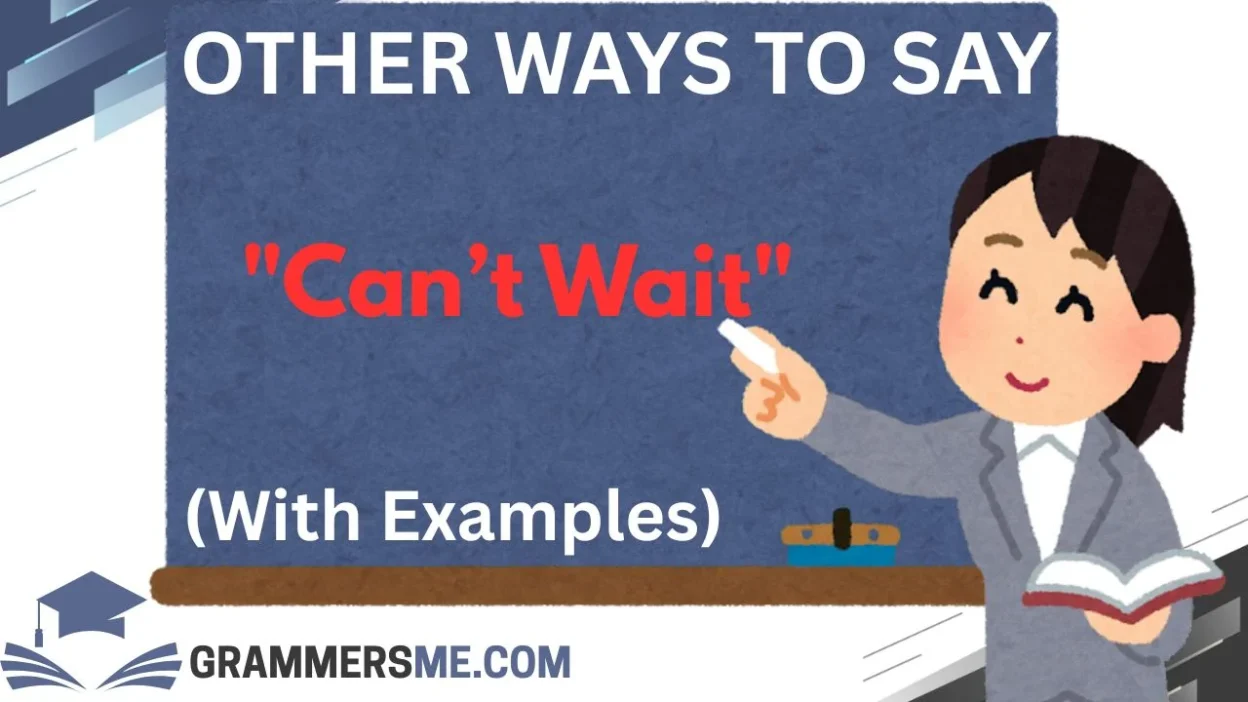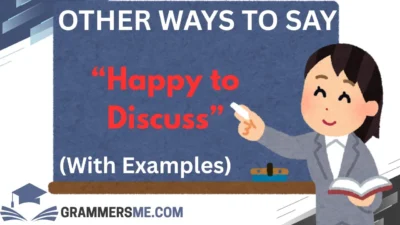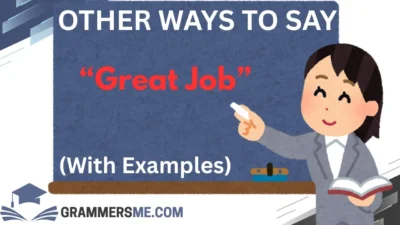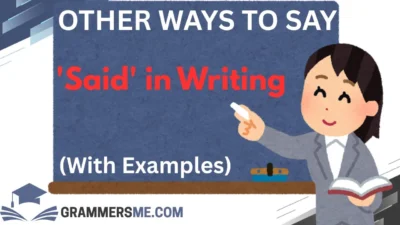Expressing excitement and anticipation can be a delightful way to connect with others. But sometimes, the phrase “can’t wait” feels overused or too casual for certain situations. Finding the right words to express your eagerness with warmth, care, and thoughtful phrasing can make your message feel more meaningful.
Whether you’re eagerly awaiting a friend’s visit, anticipating a new opportunity, or just sharing your excitement with someone special, these 30 alternatives can help you convey your feelings in a way that resonates.
What Does “Can’t Wait” Mean?
“Can’t wait” expresses a feeling of impatience or eagerness for something that will happen soon. It is often used when someone is looking forward to an event or an experience so much that they feel almost like they are unable to wait. It conveys a sense of enthusiasm and positivity, typically directed toward something enjoyable or exciting.
Is It Professional/Polite to Say “Can’t Wait”?
While “can’t wait” is widely understood and can be used in casual contexts, it might not always be the most professional or formal way to express excitement. In professional settings, it’s often better to choose more polished alternatives, especially when you’re communicating with colleagues or clients.
This helps maintain respect and keeps your tone appropriate. However, in informal or personal situations, saying “can’t wait” can convey genuine enthusiasm and warmth.
1. I’m really looking forward to it
Meaning: Expresses eagerness for something upcoming with a softer tone.
Explanation: This phrase communicates enthusiasm but in a more composed and polite manner than “can’t wait.”
Scenario Example: “I’m really looking forward to our dinner on Friday!”
Best Use: In both personal and professional settings when you want to express excitement without sounding too casual.
Not Use: When you’re feeling too impatient or informal, as it may sound more subdued.
Tone: Warm, polite, thoughtful.
2. I’m so excited for that!
Meaning: A more intense way of showing your enthusiasm.
Explanation: This phrase conveys a higher level of excitement and energy, perfect when you want to show you’re thrilled about something.
Scenario Example: “I’m so excited for the concert tomorrow!”
Best Use: When you’re speaking to a friend, family member, or colleague in a casual context.
Not Use: In professional emails or formal settings where you want to maintain composure.
Tone: Energetic, joyful.
3. I can’t wait to see it unfold
Meaning: Suggests a sense of curiosity or anticipation about the way something will develop.
Explanation: This is a great option when you’re looking forward to something that’s not just an event, but a process or journey.
Scenario Example: “I can’t wait to see it unfold on the big screen!”
Best Use: When anticipating a creative project or something that will evolve over time.
Not Use: For simple or immediate plans, as it implies a more extended period of waiting.
Tone: Curious, reflective.
4. I’m counting the days
Meaning: Expresses excitement with a focus on how eagerly you’re waiting for the event.
Explanation: This phrase emphasizes the passage of time, showing that you’re eagerly awaiting something to happen soon.
Scenario Example: “I’m counting the days until the weekend!”
Best Use: For events that are happening soon and that you’re very eager to experience.
Not Use: For longer-term plans, as it can sound a bit impatient.
Tone: Eager, anticipatory.
5. I’m so thrilled for this!
Meaning: Communicates heightened excitement or enthusiasm.
Explanation: This phrase conveys a higher level of excitement and joy compared to the typical “can’t wait.”
Scenario Example: “I’m so thrilled for your wedding next month!”
Best Use: In personal conversations with close friends or family.
Not Use: In formal or business-related contexts, as it may come off as too emotional.
Tone: Excited, joyful.
6. I’m looking forward to it more than anything
Meaning: Expresses that the event is the thing you are most excited about.
Explanation: This phrase emphasizes the importance and significance of the event you’re anticipating.
Scenario Example: “I’m looking forward to it more than anything—this trip is going to be amazing!”
Best Use: When you want to show that the event is highly anticipated.
Not Use: When you’re looking forward to something less significant, as it might seem too intense.
Tone: Passionate, sincere.
7. I can hardly wait
Meaning: Indicates impatience in a way that is still warm and conversational.
Explanation: This alternative suggests that you are so eager that it’s difficult to wait for what’s coming.
Scenario Example: “I can hardly wait for our next adventure!”
Best Use: Casual conversations with friends or family members.
Not Use: In professional communication, as it may sound too informal.
Tone: Eager, informal.
8. I’m so eager for it
Meaning: Expresses eagerness or enthusiasm for something with a polite tone.
Explanation: This phrase sounds thoughtful while still conveying excitement.
Scenario Example: “I’m so eager for the new season of that show to start!”
Best Use: In both professional and personal contexts when you want to sound enthusiastic but polite.
Not Use: In very casual situations where a more relaxed tone is appropriate.
Tone: Thoughtful, respectful.
9. I’m pumped for this!
Meaning: A very informal way of expressing excitement, often used when you’re feeling energetic.
Explanation: This is a great alternative for showing excitement in a casual and fun way, usually among friends.
Scenario Example: “I’m pumped for our road trip this weekend!”
Best Use: Informal conversations, especially with close friends or peers.
Not Use: In formal settings, as it may sound overly casual.
Tone: Energetic, informal.
10. I’m so looking forward to it
Meaning: A soft and polite way to express excitement.
Explanation: This variation shows anticipation but in a more refined way.
Scenario Example: “I’m so looking forward to catching up with you this weekend.”
Best Use: In professional emails or more formal personal conversations.
Not Use: When you want to express high-energy excitement.
Tone: Polite, refined.
11. I’m genuinely excited
Meaning: Shows heartfelt enthusiasm and true anticipation.
Explanation: This phrase conveys that your excitement isn’t just surface-level—it comes from a sincere place.
Scenario Example: “I’m genuinely excited about the upcoming retreat.”
Best Use: In both personal and semi-professional conversations where sincerity is appreciated.
Not Use: In highly formal writing where more neutral language is expected.
Tone: Sincere, warm.
12. I’ve been looking forward to this
Meaning: Indicates anticipation that has built up over time.
Explanation: This suggests that the event has been on your mind and you’ve been eager about it for a while.
Scenario Example: “I’ve been looking forward to this meeting all week.”
Best Use: Great for both professional and personal settings.
Not Use: For last-minute or spontaneous events.
Tone: Genuine, anticipatory.
13. I’m over the moon about it
Meaning: A playful and very expressive way to show excitement.
Explanation: This idiom expresses sheer joy and anticipation in a charming, lighthearted way.
Scenario Example: “I’m over the moon about seeing you next weekend!”
Best Use: In informal conversations, especially when sharing joyful news.
Not Use: In professional or serious settings—it’s too whimsical.
Tone: Playful, joyful.
14. I’m counting down the days
Meaning: Highlights how eagerly you’re watching time pass until the event.
Explanation: It suggests excitement that’s hard to contain and time-focused anticipation.
Scenario Example: “I’m counting down the days until our beach vacation!”
Best Use: For short-term plans you’re truly excited about.
Not Use: When the event is too far away or when you want to keep things more neutral.
Tone: Eager, fun.
15. I feel like a kid on Christmas morning
Meaning: Reflects pure and nostalgic excitement.
Explanation: This simile captures childlike joy and expectation, especially for something meaningful.
Scenario Example: “I feel like a kid on Christmas morning just thinking about our launch day!”
Best Use: In casual or creative work environments, or with friends.
Not Use: In formal, professional emails or serious discussions.
Tone: Playful, nostalgic.
16. It’s all I’ve been thinking about
Meaning: Suggests the event or thing has consumed your thoughts.
Explanation: Shows that you’re so excited, it’s been on your mind constantly.
Scenario Example: “Your visit is all I’ve been thinking about lately!”
Best Use: For close relationships or deeply anticipated moments.
Not Use: When trying to appear neutral or emotionally restrained.
Tone: Intimate, heartfelt.
17. I’m buzzing with excitement
Meaning: A very expressive way to show high energy and anticipation.
Explanation: Suggests that you’re so excited, it’s almost like an electric energy running through you.
Scenario Example: “I’m buzzing with excitement about the big reveal tomorrow!”
Best Use: Casual settings, social media posts, or with peers.
Not Use: In conservative or formal work settings.
Tone: Energetic, expressive.
18. I’m thrilled about it
Meaning: Communicates joy and anticipation with elegance.
Explanation: A refined yet powerful way to express genuine excitement.
Scenario Example: “I’m thrilled about collaborating on this new project with you.”
Best Use: Suitable for both professional and personal settings.
Not Use: When the tone needs to be extremely low-key or neutral.
Tone: Excited, polished.
19. Looking forward with excitement
Meaning: A polished way to show anticipation with a dash of emotion.
Explanation: Combines professionalism with emotion, making it a great go-to for emails and invites.
Scenario Example: “Looking forward with excitement to our team offsite next week.”
Best Use: In polite correspondence or formal event planning.
Not Use: In texts or casual group chats—might sound too structured.
Tone: Polished, respectful.
20. Eagerly anticipating it
Meaning: A sophisticated way of saying “can’t wait.”
Explanation: This phrase is elegant, and perfect for when you want to convey excitement in a composed, articulate way.
Scenario Example: “I’m eagerly anticipating our meeting next Thursday.”
Best Use: In professional emails, interviews, or formal messages.
Not Use: In casual or emotionally charged messages—it may feel too cold.
Tone: Formal, refined.
21. I’m so ready for this
Meaning: Shows strong anticipation and confidence.
Explanation: This phrase expresses a sense of preparedness and eagerness, often used when someone is emotionally or mentally set for what’s coming.
Scenario Example: “I’m so ready for the weekend getaway!”
Best Use: Great in casual conversations or when you’re hyping something up with friends.
Not Use: In highly formal or conservative contexts.
Tone: Confident, enthusiastic.
22. I’m beyond excited
Meaning: Takes excitement to the next level—more than just “very excited.”
Explanation: Adds extra emotional weight to your message, emphasizing that your excitement can hardly be contained.
Scenario Example: “I’m beyond excited for your big announcement!”
Best Use: Personal texts, social media posts, or heartfelt messages.
Not Use: In professional emails where emotion should be kept balanced.
Tone: Emotional, heartfelt.
23. I’m itching to get started
Meaning: Shows eagerness to begin something soon.
Explanation: This phrase paints a vivid picture of impatience in a playful, energized way.
Scenario Example: “I’m itching to get started on this new project!”
Best Use: In creative or fast-paced environments where enthusiasm is welcomed.
Not Use: In traditional or conservative workplaces.
Tone: Eager, lighthearted.
24. The suspense is killing me
Meaning: Humorously implies that the anticipation is hard to handle.
Explanation: Often said with a smile or joking tone, this phrase shows a high level of eagerness but in a fun, exaggerated way.
Scenario Example: “The suspense is killing me—just tell me what happened already!”
Best Use: In humorous or close-knit conversations.
Not Use: In professional or serious contexts.
Tone: Playful, dramatic.
25. I’ve been dreaming about this
Meaning: Suggests something deeply wished for or emotionally significant.
Explanation: Conveys long-standing anticipation, often for something meaningful or special.
Scenario Example: “I’ve been dreaming about this trip for years.”
Best Use: For heartfelt conversations or major life events.
Not Use: For simple, everyday plans—it might sound overly intense.
Tone: Sentimental, meaningful.
26. I’m thrilled beyond words
Meaning: Expresses overwhelming joy and anticipation.
Explanation: A poetic and powerful way to describe extreme excitement.
Scenario Example: “I’m thrilled beyond words to finally meet your family!”
Best Use: In emotional or personal messages.
Not Use: In neutral or analytical discussions.
Tone: Passionate, emotional.
27. I’m getting butterflies just thinking about it
Meaning: Describes excitement mixed with a bit of nervous anticipation.
Explanation: Suggests that the event means a lot to you, possibly even making you a little anxious in a good way.
Scenario Example: “I’m getting butterflies just thinking about the big day.”
Best Use: For events that carry emotional significance like weddings, performances, or reunions.
Not Use: In serious or impersonal communication.
Tone: Emotional, sincere.
28. This can’t come soon enough
Meaning: Expresses impatience and eagerness.
Explanation: This phrase shows that you’re finding it hard to wait because you’re so excited.
Scenario Example: “Friday can’t come soon enough—this week has been long!”
Best Use: Casual settings, relatable moments.
Not Use: In formal writing or with someone who might take it too literally.
Tone: Relatable, informal.
29. This is the highlight of my week/month/year
Meaning: Expresses that the upcoming event is something you cherish deeply.
Explanation: This phrase helps communicate value and deep excitement toward something that truly matters to you.
Scenario Example: “Your visit is the highlight of my month!”
Best Use: When you want to let someone know how special the moment is.
Not Use: For generic or low-key events.
Tone: Sincere, appreciative.
30. I’m thrilled just thinking about it
Meaning: Communicates how the mere thought of something excites you.
Explanation: It’s a beautifully worded way to show anticipation, even before the event arrives.
Scenario Example: “I’m thrilled just thinking about the opportunity to collaborate.”
Best Use: In warm professional messages or heartfelt conversations.
Not Use: In purely factual or neutral statements.
Tone: Warm, polished.
Conclusion
When we say “can’t wait,” we’re often expressing more than just anticipation—we’re sharing emotion, excitement, and connection. But using more thoughtful, personal alternatives can enhance how your message lands. It’s about choosing the words that match your tone, your relationship, and the moment itself.
Personally, I’ve found that switching things up—especially in emails or messages where warmth matters—can make all the difference. People feel it when your words come from a place of care.
FAQs
1. What’s the most professional way to say “can’t wait”?
Answer: Try “I’m really looking forward to it” or “I’m eagerly anticipating it.” Both are polished and respectful.
2. Can I use “can’t wait” in an email to my manager?
Answer: You can, especially if you have a friendly rapport, but “looking forward to” may be safer and more appropriate.
3. What’s a warm yet respectful alternative for formal occasions?
Answer: “I’m genuinely excited” or “I’m thrilled about it” strike a good balance.
4. Is it okay to use playful alternatives like “buzzing with excitement” in the workplace?
Answer: In casual or creative environments, yes. But for traditional or formal settings, keep it more reserved.
5. Why do word choices like this matter?
Answer: They help you connect more deeply, show emotional intelligence, and tailor your message to your audience.




